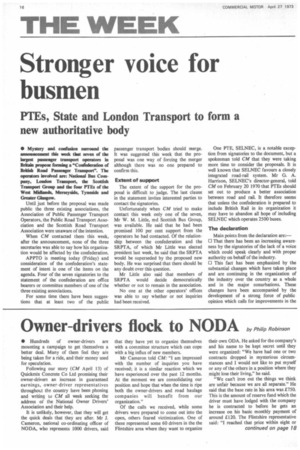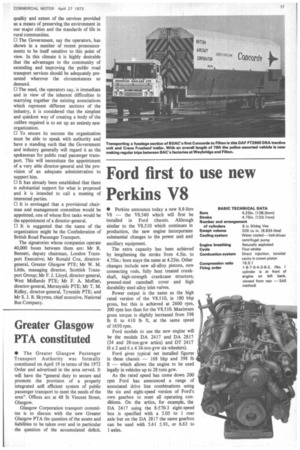Stronger voice for busmen
Page 18

Page 19

If you've noticed an error in this article please click here to report it so we can fix it.
PTEs, State and London Transport to form a new authoritative body
• Mystery and confusion surround the announcement this week that seven of the largest passenger transport operators in Britain propose forming a "Confederation of British Road Passenger Transport". The operators involved are: National Bus Company, London Transport, the Scottish Transport Group and the four PTEs of the West Midlands, Merseyside, Tyneside and Greater Glasgow.
Until just before the proposal was made public the three existing associations, the Association of Public Passenger Transport Operators, the Public Road Transport Association and the Scottish Road Transport Association were unaware of the intention.
When CM contacted them this week, after the announcement, none of the three secretaries was able to say how his organization would be affected by the confederation.
APPTO is meeting today (Friday) and consideration of the confederation's statement of intent is one of the items on the agenda. Four of the seven signatories to the statement of the confederation are office bearers or committee members of one of the three existing associations.
For some time there have been suggestions that at least two of the public passenger transport bodies should merge. It was suggested this week that the proposal was one way of forcing the merger although there was no one prepared to confirm this.
Extent of support The extent of the support for the proposal is difficult to judge. The last clause in the statement invites interested parties to contact the signatories.
Unfortunately when CM tried to make contact this week only one of the seven, Mr W. M. Little, md Scottish Bus Group, was available. He said that he had been promised 100 per cent support from the operators he had contacted. Of the relationship between the confederation and the SRPTA, of which Mr Little was elected president last week, he said that the SRPTA would be superseded by the proposed new body. He was surprised that there should be any doubt over this question.
Mr Little also said that members of SRPTA would decide democratically whether or not to remain in the association.
No one at the other operators' offices was able to say whether or not inquiries had been received_ One PTE, SELNEC, is a notable exception from signatories to the document, but a spokesman told CM that they were taking more time to consider the proposals. It is well known that SELNEC favours a closely integrated road-rail system. Mr G. A. Harrison, SELNEC's director-general, told CM on February 20 1970 that PTEs should set out to produce a better association between road and rail. It therefore seems that unless the confederation is prepared to include British Rail in its organization it may have to abandon all hope of including SELNEC which operates 2500 buses.
The declaration Main points from the declaration are:— D That there has been an increasing awareness by the signatories of the lack of a voice which could speak clearly and with proper authority on behalf of the industry.
D This fact has been emphasized by the substantial changes which have taken place and are continuing in the organization of the industry over the country as a whole and in the major conurbations. These changes have been accompanied by the development of a strong force of public opinion which calls for improvements in the quality and extent of the services provided as a means of preserving the environment in our major cities and the standards of life in rural communities.
0 The Government, say the operators, has shown in a number of recent pronouncements to be itself sensitive to this point of view. In this climate it is highly desirable that the advantages to the community of extending and improving the public road transport services should be adequately presented wherever the circumstances so demand.
0 The need, the operators say, is immediate and in view of the inherent difficulties in marrying together the existing associations which represent different sections of the industry, it is considered that the simplest and quickest way of creating a body of the calibre required is to set up an entirely new organization.
0 To ensure its success the organization must be able to speak with authority and have a standing such that the Government and industry generally will regard it as the spokesman for public road passenger transport. This will necessitate the appointment of a very able director-general and the provision of an adequate administration to support him.
0 It has already been established that there is substantial support for what is proposed and it is intended to call a meeting of interested parties.
O It is envisaged that a provisional chairman and management committee would be appointed, one of whose first tasks would be the appointment of a director-general.
O It is suggested that the name of the organization might be the Confederation of British Road Passenger Transport.
The signatories whose companies operate 40,000 buses between them are; Mr R. Bennett, deputy chairman, London Transport Executive; Mr Ronald Cox, directorgeneral, Greater Glasgow PTE; Mr W. M. Little, managing director, Scottish Transport Group; Mr F. J. Lloyd, director-general, West Midlands PTE; Mr F. A. Moffatt, director-general, Merseyside PTE; Mr T. M. Ridley, director-general, Tyneside PTE; and Mr S. J. B. Skyrme, chief executive, National Bus Company_












































































































